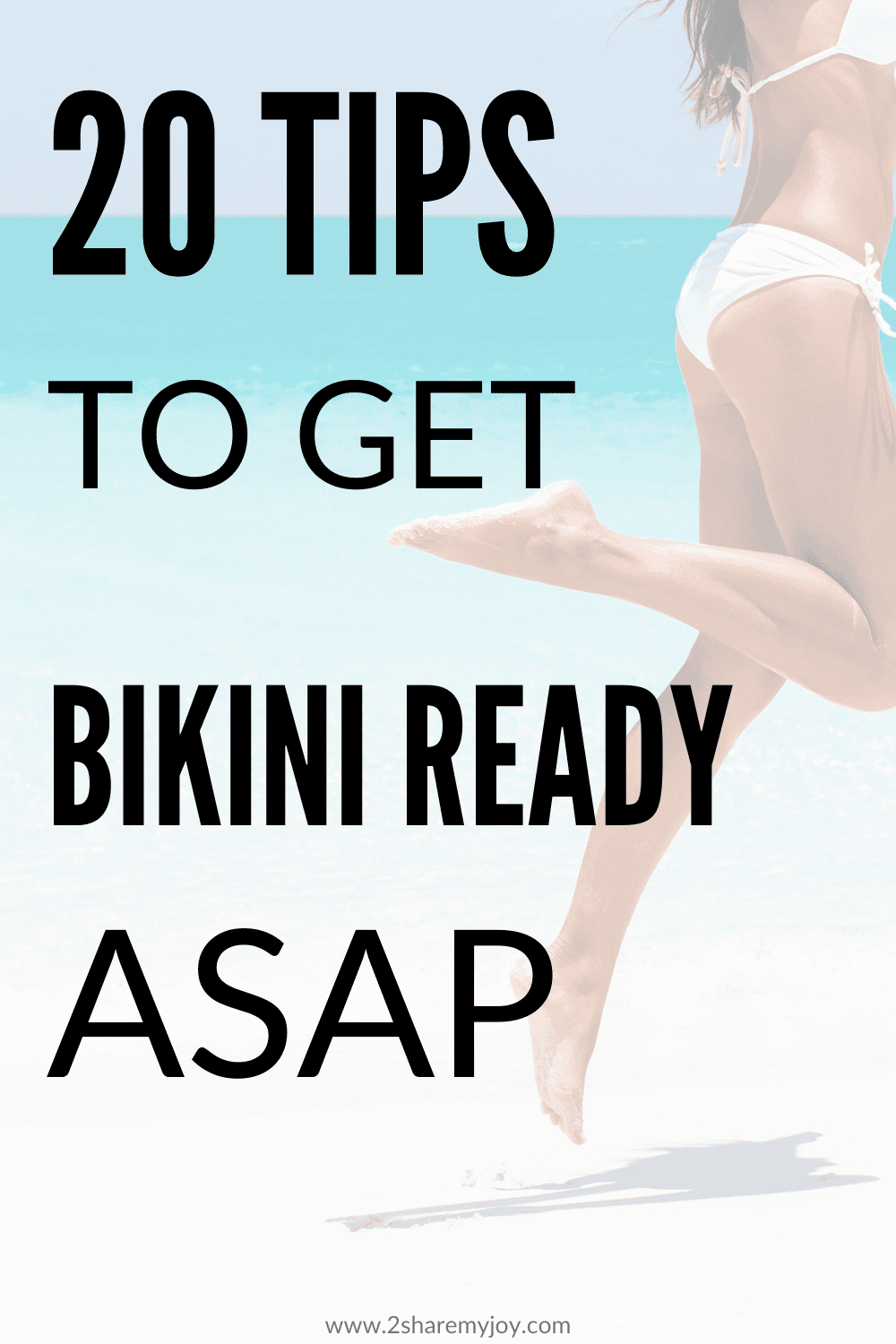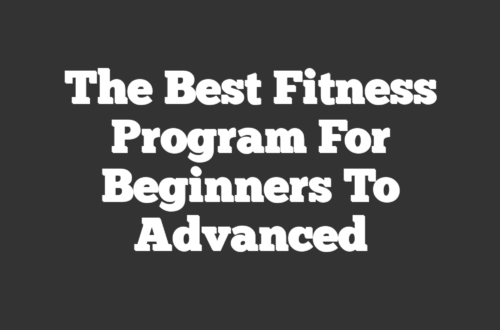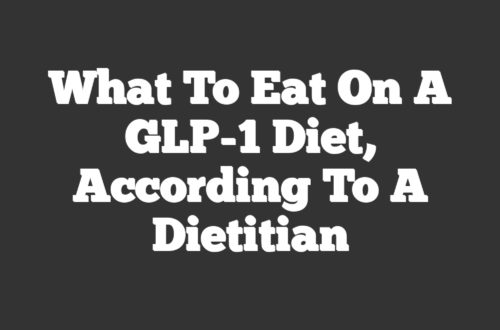As summer approaches, the idea of slipping into a bikini can be both exciting and daunting.
Whether you’re planning a beach vacation or just want to feel more confident in your swimwear, getting bikini ready is about more than just losing weight—it’s about making healthy lifestyle changes.
In this guide, we’ll explore 20 practical tips to get bikini ready asap to help you look and feel your best this summer.
1. Set Realistic Goals
Start by setting achievable goals that are specific, measurable, and time-bound. Whether it’s losing a few pounds, toning up, or simply feeling healthier, clear goals will guide your journey and keep you motivated.
Getting bikini ready means many things. Get clear on what lifestyle you want to enjoy this summer, how you want to feel, and set your goals accordingly.
2. Stay Hydrated
Drinking plenty of water is crucial for your health, aiding in digestion, hydration, and even fat loss.
Aim for at least 8 glasses a day, and carry a reusable water bottle to remind yourself to drink.
3. Follow a Balanced Diet
Incorporate a variety of foods in your diet from all food groups: fruits, vegetables, lean proteins, and whole grains.
This diversity ensures you get all the necessary nutrients to fuel your body and mind.
If you in need of some light summer meal, be sure to head over to: 36 Healthy plant based summer recipes.
4. Commit to Regular Exercise
Exercise is essential not only for weight loss but also for your overall health. Combine cardio workouts to burn calories with strength training to build muscle and flexibility exercises to reduce injury risk.
Check out the 30 Day Summer Body Challenge to ensure regular exercise. It is only 5-10 minutes a day, but a great way to sneak in exercise to make it a long term habit.
5. Reduce Salt Intake
Excess salt can lead to water retention, making you feel bloated. Try to limit high-sodium foods and opt for fresh or dried herbs to flavor your meals.
6. Cut Down on Processed Foods
Processed foods often contain unhealthy fats, sugars, and calories. These can make you crave more food which leads to overeating, which can also make you look more bloated, or gain excess fat.
Focus on eating whole and unprocessed foods as much as possible to support a healthy body and boost energy levels so you can enjoy your fun summer activities even more!
7. Increase Fiber Intake
Fiber helps you feel full longer and supports digestive health. Include plenty of high-fiber foods like beans, berries, and whole grains in your diet.
8. Prioritize Sleep
Good sleep is fundamental to health and weight loss. It rejuvenates the body, regulates hunger hormones, and keeps you energized throughout the day.
Good sleep hygiene involves habits and practices that are conducive to sleeping well on a regular basis. Here are some detailed tips to enhance sleep hygiene, particularly useful for someone preparing to feel their best for summer:
- Regular Sleep Schedule: Try to go to bed and wake up at the same time every day, even on weekends. Consistency reinforces your body’s sleep-wake cycle.
- Create a Bedtime Routine: Develop a relaxing routine right before bedtime. This could involve reading a book or meditating. Avoid stimulating activities such as intense exercise or heavy discussions.
- Optimize Your Sleep Environment: Ensure your bedroom is conducive to sleep. It should be cool, quiet, and dark. Invest in good quality curtains or blackout shades to block out light, and consider using earplugs or a white noise machine to eliminate or reduce noise.
- Comfortable Bedding: Your mattress and pillows should be comfortable and supportive. The quality of your bedding can significantly affect your sleep, so it might be worth investing in high-quality materials that suit your body type and sleeping style.
- Limit Exposure to Screens: Avoid screens (phones, tablets, computers, television) at least an hour before bed. The blue light emitted by screens can interfere with your ability to fall asleep.
- Watch Your Diet: Avoid large meals, caffeine, and alcohol before bedtime. While alcohol might help you relax, it can interfere with your sleep cycle once you’re asleep.
- Physical Activity: Regular physical activity can help you fall asleep faster and enjoy deeper sleep—but don’t perform vigorous activities too close to bedtime.
- Manage Worries: Try to resolve your worries or concerns before bedtime. Jotting down what’s on your mind and then setting it aside for tomorrow can help clear your mind.
- Use Relaxation Techniques: Techniques such as deep breathing, progressive muscle relaxation, and visualization can help ease you into sleep.
- Limit Naps: If you choose to nap during the day, limit the nap to 20-30 minutes. This will help prevent sleep disturbances at night.
By improving these aspects of sleep hygiene, you can enhance both the quality and quantity of your sleep, which is essential for overall health and achieving your fitness goals.
Good sleep not only helps in recovering from workouts but also in managing hunger and maintaining a good mood, all of which are beneficial when getting bikini ready.
9. Practice Mindful Eating
Being mindful when eating helps control how much you eat and enhances your relationship with food. Eat slowly and without distractions to allow your body to recognize when it’s full.
Wait 5 minutes before getting seconds. Give the satiety a chance to kick in and you are less likely to overeat.
Also, don’t wait too long to eat. If you are at a point where you feel “hangry” you are more likely to overeat as well.
It is important to practice listening to your body for hunger cues and fullness cues. Make it a practice during the day to tune into your body.
10. Manage Stress Effectively
Stress can negatively impact hormone levels and sleep and therefore slow down fat loss. Stress can also lead to overeating and weight gain. Find healthy ways to manage stress, such as yoga, meditation, or deep breathing exercises.
If these don’t help, it is okay to talk to a professional mental health care expert.
11. Control Portion Sizes
Understanding portion sizes can help prevent overeating. fill half your plate with vegetables, 1/3 of the plate with protein, and the rest with whole grains. This formula will fill and fuel you without overeating.
By increasing nutrient density in your meals, your body is satisfied quicker and longer from the meal. Therefore you can reduce calorie intake drastically per meal without worrying about counting calories.
This is a great way to focus on healthy eating habits to glow from the inside out this summer, and not worry about calories.
12. Track Your Progress
Keep a journal of your food intake and physical activity. This accountability can help you identify patterns and areas for improvement.
Keeping a detailed journal of your progress when working towards getting bikini ready is a crucial strategy. It not only serves as a tool for accountability but also provides insights into what works best for you.
Here are some ideas on tracking your progress:
- Log Your Food Intake: Write down everything you eat and drink each day. Be as specific as possible, noting portion sizes and the ingredients in your meals. This can help you become more aware of your eating habits and identify areas where you may have to add more healthy foods or reduce some processed foods.
- Record Your Physical Activity: Document each workout, including the type of exercise, duration, intensity, and how you felt during and after the session. This will help you determine the effectiveness of different workouts and how they contribute to your goals.
- Monitor Your Body Measurements: In addition to tracking weight, take regular measurements of your waist, hips, thighs, and any other areas of interest. This can provide a more comprehensive view of your physical changes, especially since muscle gains might offset fat loss on the scale (If fat loss is your goal).
- Note Your Emotional Well-being: Keep track of how you feel each day. Are you feeling motivated? Tired? Stressed? Connecting your emotional states with your eating patterns and workout habits can offer valuable insights into the psychological aspects of your fitness journey.
- Set Weekly Goals: Break your main goals into smaller, weekly targets, and write them down. Review these goals weekly to assess your progress and make adjustments as necessary.
- Use Photos for Visual Progress: Taking regular photos in a consistent pose can provide visual evidence of your changes. This can be particularly motivating and revealing, showing changes that might not be noticeable day by day.
- Reflect on Your Sleep Quality: Since sleep has a significant impact on your fitness and weight loss efforts, recording your sleep patterns and quality can help you understand the relationship between your sleep and other aspects of health.
- Track Your Water Intake: Hydration is key for overall health and can impact your energy levels and physical performance. Keeping a log of how much water you drink each day can help ensure you’re staying properly hydrated.
- Review and Adjust: Regularly review your journal to understand what’s working and what isn’t. This ongoing evaluation makes your journal a dynamic tool that helps guide your decisions and strategies.
- Celebrate Successes: Make sure to note and celebrate your successes, no matter how small. This can boost your motivation and commitment.
This documentation process not only helps in maintaining consistency but also empowers you to make informed adjustments based on reliable data from your own experiences.
13. Avoid Sugars
Minimize the intake of sugars, especially from sugary drinks and sweets. They can contribute to weight gain and provide little nutritional benefit.
To cut back:
- Replace sugary snacks with healthier options like fruits or nuts.
- Drink water, herbal teas, or infused water instead of sugary sodas or fruit juices.
- Read food labels to avoid hidden sugars in processed foods and condiments.
- Don’t buy packets of sweets and bring them home. Rather grab an occasional one serving size treat when you are out.
14. Incorporate Healthy Fats
Not all fats are bad. Healthy fats like those found in avocados, nuts, and seeds are crucial for your body’s well-being. Adding a little bit of fat to each meal can help with the feeling of fullness but it also helps some vitamins to be absorbed better.
Healthy fats are essential for your body’s energy, cell growth, and the absorption of certain nutrients. Including them can also help keep you full and satisfied.
15. Plan Your Meals
Meal planning is a great way to stick to a healthy eating regimen. It saves time, reduces stress, and helps you avoid unhealthy choices.
Meal planning can prevent last-minute unhealthy eating decisions and help you maintain a balanced diet:
- Spend some time each week planning your meals and snacks.
- Prepare and store meals in advance, especially when you anticipate a busy schedule.
- Always have healthy snacks on hand to avoid the temptation of fast food.
16. Choose Healthy Snacks
Opt for snacks that will fuel your body and keep you feeling full, like veggies, fresh fruit, or a handful of nuts.
Smart snacking can be a part of a healthy diet, helping to manage hunger and reduce binge eating:
- Keep a variety of pre-portioned, healthy snacks readily available.
- Combine protein with a carb, like apple slices with peanut butter or carrots with hummus, for a more satisfying snack.
- Avoid mindless snacking by only eating when you’re truly hungry.
17. Lead an Active Lifestyle
Look for opportunities to be active during the day in addition to regular workouts. Take the stairs, go for a walk during lunch, or try a new sport.
Staying active isn’t limited to structured exercise routines; it also involves making choices that contribute to more movement throughout the day:
- Take the stairs instead of the elevator.
- Park further away from the store entrance.
- Take short walking breaks every hour if you have a desk job.
- Or take a 10-20 minute early walk when it is not too hot yet (before work).
- Take on some garden projects this summer.
- Join in with your kids (or nieces) activities. This will also make you feel younger.
18. Protect Your Skin
Healthy skin complements your bikini body. Always apply sunscreen before going outdoors to protect your skin from harmful UV rays.
Good skin care complements your fitness goals and is essential when spending more time outdoors:
- Use a broad-spectrum sunscreen with at least SPF 30, even on cloudy days.
- Wear protective clothing and sunglasses to guard against UV rays.
- Stay hydrated to keep your skin moisturized from the inside out.
19. Include Protein at Every Meal
Protein is essential for muscle repair and growth. Including a source of lean protein in each meal can help keep hunger at bay and support muscle tone and even fat loss.
I recommend to eat between 20g and 40g of protein per meal (source). Here are some plant based protein options, if you are looking to try more vegan options.
Also check out my 120g vegan protein meal plan and the 80g plant based protein meal plan.
20. Celebrate Every Achievement
No matter how small, each step towards your goal is worth celebrating. This boosts morale and keeps you motivated throughout your fitness journey.
Recognizing and celebrating each step forward in your fitness journey can significantly boost your motivation and adherence to your goals:
- Set up a reward system for reaching milestones (e.g., a spa day after a month of sticking to your plan).
- Share your achievements with friends or family members for additional encouragement.
- Keep a visual representation of your progress, like a chart, checklist, or series of photos, to remind you of how far you’ve come.
Getting bikini ready is about making healthier lifestyle choices and adopting habits that enhance your overall well-being. By following these 20 tips, you’ll not only look great but also feel vibrant and full of energy.
Remember, the journey is as important as the destination. Enjoy every step and have a fantastic summer!
Be sure to also check out these summer posts:






